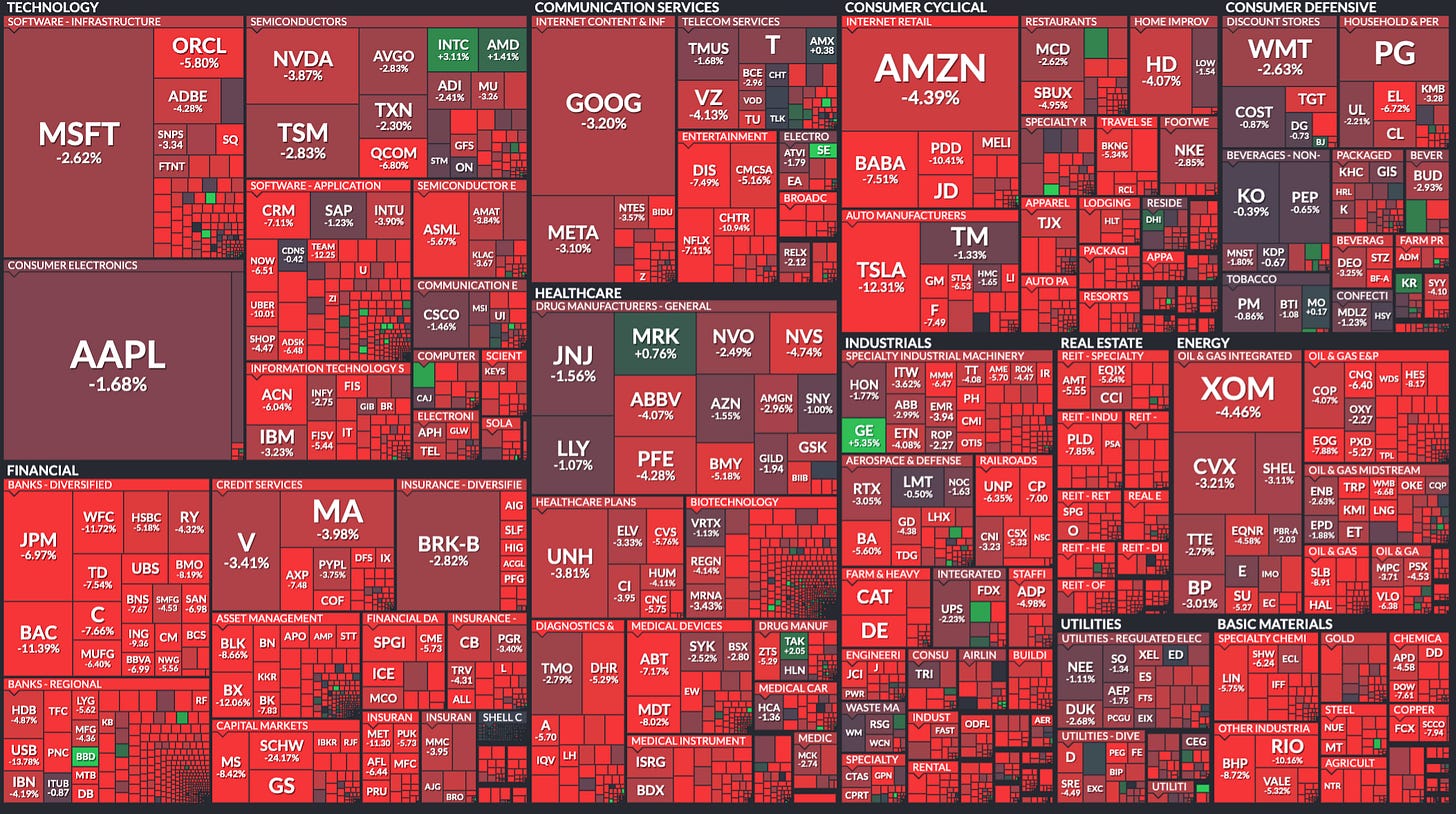📑 Research Notes for 2023-03-13
This week, we look at the Silicon Valley Bank collapse, the potential government response, record inversions in the bond market, and a potential global liquidity drain.
We conduct extensive investment research and share the most interesting content that we come across every week. Here is a curated list of this week’s top observations.
Do not reply to this email with any service requests, contact us for support if needed.
Last Week’s Market Performance Heatmap
🔗 Source
Silicon Valley Bank Collapses - What’s Next?
Silicon Valley Bank collapsed quickly and unexpectedly, with the bank suffering from a concentrated depositor base of startups and the impact of rising interest rates. The bank attempted to raise capital but was unsuccessful, leading to its closure by the FDIC. The next steps for the bank are uncertain, but it is expected to go through some sort of sale procedure. The fate of insured and uninsured depositors is also a concern, with uninsured depositors making up a large portion of the bank's depositor base. The risk of contagion and the need for regulators to act quickly to prevent another bank collapse is also discussed, as other banks are also facing similar challenges with rising interest rates.
🔗 Source
The U.S. Treasury Is Monitoring “a Few” Banks Amid SVB Losses.
Janet Yellen, the US Treasury Secretary, discusses concerns over stresses in the bond markets and recent developments with certain banks, including Silicon Valley Bank. Yellen mentions that she is monitoring a few banks very carefully due to recent financial losses. She acknowledges that when banks experience financial losses, it is a matter of concern and that she is monitoring the situation closely.
🔗 Source
Deepening Bond Yield Inversion Suggests Hard Landing.
The U.S. yield curve has edged towards a 110 basis point inversion this week, and the bond market is signaling a recession. During Congressional testimony this week, Federal Reserve Chairman Jay Powell has taken a measured tone, stating that inflation is too elevated and that raising rates is necessary to avoid letting inflation stay out of control. Short end rates have pushed higher, with three-month bills now above five percent, joining six-month T-bills for the first time since 2007. The weaker auction and the freeze of the ten-year yield at the four percent barrier are also contributing factors to the market's recession fears.
🔗 Source
Global Liquidity Drain May Be Coming for Markets.
Citigroup Inc.'s top strategist, Robert Buckland, warns of a global liquidity drain that could impact markets. Buckland notes that central banks are starting to tighten monetary policy, which could reduce liquidity and increase volatility. He adds that this could lead to market corrections, particularly for assets that have been inflated due to low interest rates. Buckland also suggests that investors diversify their portfolios and focus on companies with strong balance sheets and low debt.
🔗 Source
Curated by Joseph Lu, CFA®
Joseph is the founder and a managing director of Conscious Capital Advisors, as well as a CFA® Charterholder.
🔗 Connect with us on LinkedIn, Facebook, or Twitter.
Have a question about what we shared? Email us at info@consciouscapital.pro.
Do not reply to this email with any service requests, contact us for support if needed.
The information presented in this newsletter is for educational purposes only and is not a solicitation or recommendation for any specific security, product, service, or investment strategy.
Investments involve risk and unless otherwise stated, are not guaranteed. Be sure to consult with a qualified financial advisor, tax professional, or attorney before implementing any strategy or recommendation you may read here.






